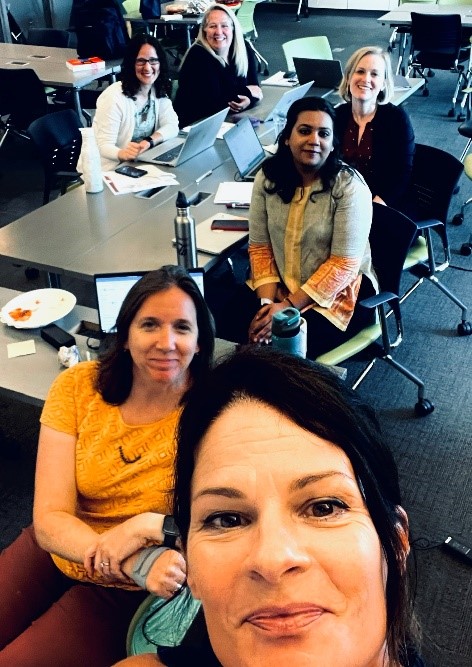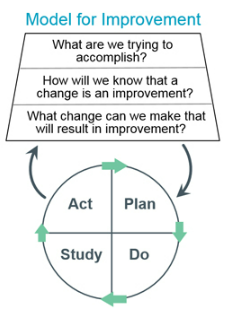What Are We Trying to Accomplish? Simple Questions to Guide Summer Continuous Improvement and 2022-23 Planning
By Kristen C. Wilcox
As we introduced in a previous blog, NYKids has partnered with Chatham Central School District, Tech Valley High (TVHS), and colleagues from the American Institutes for Research (AIR) COVID-19 Equity in Education (CEE) Project in a partnership to address the effects of the pandemic on youth and families. Through AIR we are networked with other research-practice partnerships in California, Florida, Tennessee, Texas, and Washington.
 In this partnership we seek to leverage our diverse expertise to address pre-pandemic opportunities for improvement as well as the differential impacts of the pandemic on diverse youth, families, and educators. We also seek to develop new and improved ways of nurturing youth academically, socially, and emotionally into the next school year by increasing our improvement capacities.
In this partnership we seek to leverage our diverse expertise to address pre-pandemic opportunities for improvement as well as the differential impacts of the pandemic on diverse youth, families, and educators. We also seek to develop new and improved ways of nurturing youth academically, socially, and emotionally into the next school year by increasing our improvement capacities.
While Chatham and TVHS are very different contexts, leaders and educators in both of these settings share similar concerns about barriers to learning and engagement. As NYKids studies, along with many others have revealed, many of these barriers are related to a number of circumstances youth experience in their homes and communities as well as in their schools.
Schools, more than ever, are being relied upon to be safe and inclusive spaces and generators of young people’s desire to learn, create, connect with people of diverse backgrounds and interests, and be part of something they care deeply about. They are also places where adults may struggle to maintain their passion for teaching and leading in the wake of over two years of pandemic-related disruptions and threats to their own safety and security.
As NYKids most recent study on the effects of the pandemic has shown, many teachers have indicated moderate to high increases in stress throughout the pandemic. Other research indicates that many young people, especially those most vulnerable and marginalized, have struggled to learn and develop the social-emotional skills they may have otherwise throughout the pandemic. These challenges set the stage for difficulties in using this summer for important 2022-23 school year planning.
“Empty Tanks” and the Model for Improvement
In our latest RPP “data dive” on June 30th with Tech Valley High’s Amy Hawrylchak and Sarah Fiess, and Chatham’s Lisa Cala-Ruud and Kate Jarrard, we discussed the metaphor of “empty tanks” in relation to where many educators and leaders may be with regard to their energy for engaging in improvement work and 2022-23 planning over the summer.
 Some of the ideas we floated and share here for others to consider are focused around posing Model of Improvement questions to guide summer improvement work and planning discussions.
Some of the ideas we floated and share here for others to consider are focused around posing Model of Improvement questions to guide summer improvement work and planning discussions.
The Model of Improvement has been around for at least a few decades and was largely a response from leaders in the healthcare sector to systematize continuous improvement to in turn achieve better client outcomes.
The Model simply prompts leaders and staff to engage with three key questions:
- What are we trying to accomplish?
- How will we know that a change is an improvement?
- What change can we make that will result in improvement?
These three questions can be used among and between team members to orient their improvement work and ideally should be discussed in light of any existing strategic plans and Board of Education goals.
The Institute for Healthcare Improvement offers a clear guide in how to use the Model on their website including a number of recommendations for preparing people to work together productively. These include attention to:
- Forming a team
- Setting clear and proximal (near term) aims
- Establishing measures (connected to #2 in the Model above)
- Selecting change ideas to try (connected to #3 in the Model above)
- Testing changes
- Implementing changes
- Spreading changes
NYKids uses this same model in our COMPASS institutes and (in concert with use of our research on positive outlier schools) to generate innovative change ideas (see our “direct support for schools” link for a new video overview of this process). This Model of Improvement is also in alignment with the New York State Education Department’s (NYSED) guidance on developing School Comprehensive Education Plans.
As we move forward through the summer we will check in with our partners – guiding discussions around those three questions and in support of preparing for the new school year. Stay tuned as we continue to report out on our work and discoveries as well as the work of others across the AIR RPP network.
For more tools to support continuous improvement over the summer, please check out the Carnegie Foundation for the Advancement of Teaching’s new publications on RPPs as well as designing for deeper learning. And if you’d like to engage with NYKids’ partnerships or our COMPASS institutes for continuous improvement offerings over the summer see our direct support page or reach out to us with your questions via nykids@albany.edu.
As always, we thank you for your interest in NYKids and invite you to follow us on Twitter, Facebook, and Instagram.
